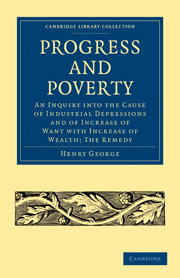 Progress and Poverty
Progress and Poverty Published online by Cambridge University Press: 07 September 2011
So deeply rooted and thoroughly entwined with the reasonings of the current political economy is this doctrine that increase of population tends to reduce wages and produce poverty, so completely does it harmonize with many popular notions, and so liable is it to recur in different shapes, that I have thought it necessary to meet and show in some detail the insufficiency of the arguments by which it is supported, before bringing it to the test of facts; for the general acceptance of this theory adds a most striking instance to the many which the history of thought affords of how easily men ignore facts when blindfolded by a preaccepted theory.
To the supreme and final test of facts we can easily bring this theory. Manifestly the question whether increase of population necessarily tends to reduce wages and cause want, is simply the question whether it tends to reduce the amount of wealth that can be produced by a given amount of labor.
This is what the current doctrine holds. The accepted theory is, that the more that is required from nature the less generously does she respond, so that doubling the application of labor will not double the product; and hence, increase of population must tend to reduce wages and deepen poverty, or, in the phrase of Malthus, must result in vice and misery. To quote the language of John Stuart Mill:
“A greater number of people cannot, in any given state of civilization, be collectively so well provided for as a smaller.[…]”
To save this book to your Kindle, first ensure [email protected] is added to your Approved Personal Document E-mail List under your Personal Document Settings on the Manage Your Content and Devices page of your Amazon account. Then enter the ‘name’ part of your Kindle email address below. Find out more about saving to your Kindle.
Note you can select to save to either the @free.kindle.com or @kindle.com variations. ‘@free.kindle.com’ emails are free but can only be saved to your device when it is connected to wi-fi. ‘@kindle.com’ emails can be delivered even when you are not connected to wi-fi, but note that service fees apply.
Find out more about the Kindle Personal Document Service.
To save content items to your account, please confirm that you agree to abide by our usage policies. If this is the first time you use this feature, you will be asked to authorise Cambridge Core to connect with your account. Find out more about saving content to Dropbox.
To save content items to your account, please confirm that you agree to abide by our usage policies. If this is the first time you use this feature, you will be asked to authorise Cambridge Core to connect with your account. Find out more about saving content to Google Drive.